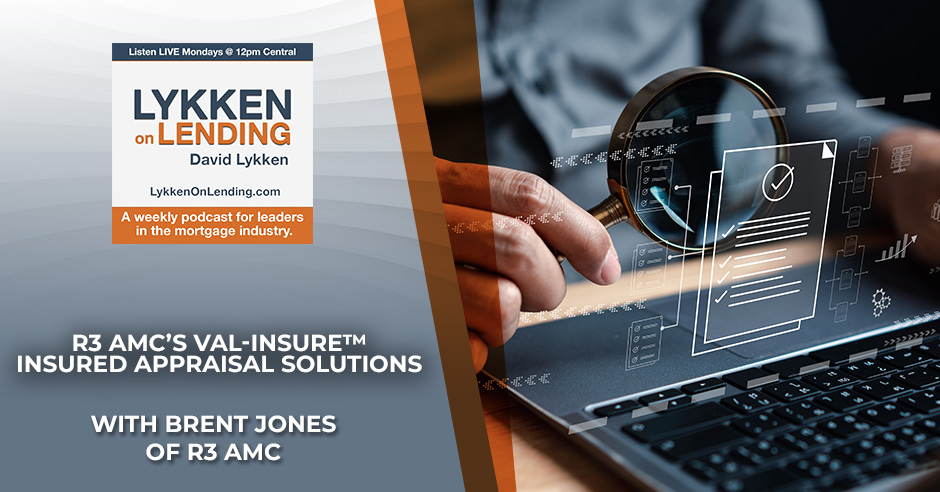An appraisal is an important part of the mortgage process that helps lenders determine the value of a property being used as collateral for a loan. In this episode, Brent Jones of R3 AMC will explain and introduce to us the basics of appraisals in the mortgage industry, including why they’re necessary, what factors impact the value of a property, and what happens if the appraisal comes in low.
—
R3 AMC’s Val-Insure™ Insured Appraisal Solutions With Brent Jones Of R3 AMC
I’m excited to have Brent Jones joining us on the show. We’re going to be talking about appraisal and some changes that are going on in the appraisal world. We all work with appraisals. It’s been something that’s been around for a long time. Brent is approaching the appraisal process or aspects of the appraisal a bit differently. I wanted to give him some airtime on our show and make you, our audience, aware of it. Now he is not in all states yet but we’re going to get into that a little bit. Brent, thank you so much for joining us.
David, thanks for having me.
I’m going over your background here. You’ve been a licensed appraiser since 1992. You live in Las Vegas and operate out of Las Vegas. You were with Fannie Mae from 2009 to 2014 and you were a senior analyst for the West United States. In 2015, you started R3 appraisal companies. That gives our audience a little bit of an introduction, but tell us some more about yourself. I’d love to hear the story of why you launched R3.
Some of my peers would argue I’ve been doing this a little too long.
I get that a lot too. It’s 72 years old and 50 years in the industry.
Many years ago, they were like, “What is this guy still doing in business here?” It’s funny because I started in the industry working for free for one of my friends that I grew up with in Northern California. His parents were appraisers and he interned. Interning had just started and I said, “This looks great. I’ll come to work for free.” Years later, here we are.
I’m not working for free anymore. At least it didn’t feel that way in a couple of years. Let’s put it that way. We’re happy to break even those days. I started this Appraisal Management Company in 2015. I’d left Fannie Mae. I had some grand ideas about creating some software that would take what I learned in working with the collateral underwriter model. What I figured out very quickly is that I’m going to go back to being a practicing appraiser and the best way for me to do that is I’m going to create an AMC that’ll give me work. That’s what handles the supply side. Here we are. It’s been a hobby. We were in one state, and then we kept growing. Now we’re in ten. We have some national clients.
Why we’re talking now is when I started with Fannie Mae. On my first day, I worked with a woman named Rachel Beam-Jares, who’s now the head of diversity at Fannie Mae, the ADI Project. She and I remained fast friends and we talked a lot about bias and diversity. I said, “I’m going to go out, try and find, and create a product that ensures our lenders and our appraisers for number one repurchase risk from the agencies.”
That’s a trend that nobody sees is going away, especially with the cost of scratch and dent market now and getting loans repurchased. The other side is we’ve got an insurance policy where appraisers are being accused of being racially biased. This insured appraisal product is called Val-Insure™. We just launched it. We’re getting some great responses on it and that’s why I’m here to chitchat about it.
It’s very exciting. Explain a little bit more when you say it’s insurance. Expand on that and give us a little more insight into what’s unique about it.
There are three different components to it. We have an insured appraisal product and the cost of this is for a lender, it’s born out by the AMC. There’s no additional cost to the lender, which is important. The second part of it is that the insurance carrier is a national carrier hallmark. They wanted me to create a bias training program that we would have the appraisers go through. We started getting the appraisers on board the response to that bias training. It’s a seventeen-minute concise, to-the-point, practical application of how to stay out of the hot water when you’re at the property and when you’ve delivered the report.
I’m chuckling when you see a seventeen-minute training session. That’s amazing. That would leave it all my intention. I have a shortened tension span.
It’s an eight-hour seat time for continuing education. An appraiser needs to know what the practical reasons are these days’ problems. The third part of it is that we’ve got a QC project after that. When the report is delivered, we have automated underwriting as everybody does, but we also have the reports hand-read, and then we get that QC feedback loop as well. We’re trying to stop this at the butt, if you would, to make sure that these problems don’t escalate.
If you talk to anybody, Peter Christensen is one of our legal counselors and did the legal review and opinion for us. As he says, “The whole thing can be stopped right at the time of the borrower complaint. That’s all how that reconsideration is handled. It’s all how that communication is handled.” We want to make everybody aware, loan officers as well, that we have training for them. We’ve got the recognition of the problem that could happen if this isn’t handled correctly at the beginning before they get involved.
A borrower complaint is easily handled through the right communication of their reconsideration. Click To TweetEvery appraiser has E&O insurance but I have a feeling that this is different. Could you explain the difference?
That was one of the first things that made me come up with this. I called my insurance carrier, both as an AMC and appraiser, and said, “Am I covered?” If you read the E&O, it’s all an exclusionary part of the policy. If you’re proven guilty, whether it’s an AMC or an appraiser, the E&O cannot cover it. What we wanted to do is create an insured product, number one, for myself as an AMC, but also for the appraisers that do work for me. We got a bonus where we’re able to indemnify the lender against any overvaluation risk where the agencies are saying that the appraiser missed it on the high side.
Explain how that works when you say they miss it and not side. How does it work in a practical transaction? What could a lender expect?
Everybody goes off of the Fannie Mae scoring system, which is called the SSRs, Submission Summary Reports. You get a Fannie Mae and Freddie Mac score. If you have a high score, 9 times out of 10 are going to be sent to some triage at the agencies to be further reviewed. If it has an overvaluation flag, then that file will get reviewed. If it’s found to be, I believe, the tolerance and it was back then 10% higher than what they think it is, they can send the loan back to the lender for repurchase. They’ve got to take the loan back and figure out what to do with it, whether they’re going to hold it or sell it in the scratch and dent market.
They go back and forth. In that scenario, if that should happen with your appraisers as a part of your AMC or anyone working with you, then what happens? How do you step in? Do they contact you or the AMC?
We would handle all the rebuttals.
As it relates to the appraisal only.
It’s compared against a retrospective appraisal. There are caps on the insurance up to $100,000 on each side. The bottom line is we fully support the lender when that happens. We’ll try and get it reversed. If not, then we indemnify them for that loss.
This has got to be at an additional cost to the appraisal. Yet, you say you’re covering all that. Does that mean you’ve increased your fees to cover all of this? How are you staying competitive?
The cost of the insurance is high, but we are anticipating that as the risk experience for the insurance company, it’s going to go down. We’re eating it now. We’ve also had appraisers who are willing because of the insurance are willing to reduce their fees to be a part of the program. Right now, appraisers are hungry. They’re looking for anything that gives me an advantage to be able to get them to work. I was terrified about this video. It’s putting yourself out there to a group of 70,000 appraisers. You never knew what the response was. I’m so thrilled with the way that everybody has responded to it, supported it, and the way they want to be a part of it. Even now as we send over these QC feedbacks, there’s, “I missed that. I thought I’d taken that out.” I’m super pleased with the way all of this has transpired.

Insured Appraisal Solutions: Appraisers right now are looking for anything that gives them advantages that will get them to work.
How long have you been doing this with the insurance rep?
We started insuring in April 2023. We have ten lenders already onboarded with it. Everybody likes the price. It’s a no-brainer to be insured or not to be. It doesn’t cost me any more money. Especially the smaller mini-C lenders where one of these cases can wipe out an entire six months of earnings.
The costs of the appraisal are relatively the same. Is it slightly more expensive?
We work within the lender’s guidelines. Sometimes, there’s some elasticity where we can charge more. Sometimes there isn’t. We can go in and say, “We can do it for the same as what you’re doing now.” If we’re able to pay the appraiser more, then we usually get a better turn time. It’s threading that needle if you would.
What are some of the other benefits to the lenders? Anything that we haven’t talked about so far?
As an appraisal management company, we do some things differently. We’re a boutique, if you would. we’re very hands-on being in ten states.
Let’s run through those ten states real fast.
California, Utah, Nevada, Arizona, Colorado, Texas, North Carolina, Georgia, and Florida. How’d I do?
Really good.
We’ll expand with our clients. You’ve got to be prudent in terms of any expansion, but the things that we do that are notable is that the biggest thing for a loan officer. I’m married to one so I have that going for me as well. When she gets an appraisal that comes in low, we fully support her. Nobody cares about anything other than that.
I wouldn’t touch that one with a ten-foot pole.
Thank God I’m not her AMC, so that’s good. The bottom line is we fully support any value issue mediation because of my experience being able to talk to agents. I do a lot of continuing education for realtors. I do a lot of classes and seminars. Me talking to a realtor about a value issue is incredibly more effective than a loan officer trying to guess why the appraisal came in low. That’s a high-touch service myself, my partner, and my analyst. We never leave the loan officer unsupported when that at-risk transaction occurs. We call it heads up. People would say, “Thanks for the heads up.” We go, “Okay, perfect.” I’ve been on the phone with sellers, buyers, and both agents. I helped mediate and get the expectations right. In this market, every deal is precious.
Talking to a realtor about a value issue is incredibly more effective than speaking to a loan officer trying to guess why the appraisal came in low. Click To TweetAre you growing at a pretty crazy rapid rate? Are we going to have growth issues? Managing growth is the biggest challenge.
It’s a very easy business management from elasticity standpoint. There are so many talented people now out there looking for work because everybody had to retrench so much. Growth is a great problem. I want that one.
It sounds like it would because I would assume appraisers are going to say, “Look at that model. There’s no one else that has anything like this out there. I want to go to work again and signed up with AMC.” I’m assuming you’re going to be growing and expanding on that note. At what rate will you be adding states, do you think?
We’ll go where the clients tell us to go. I’m not going to not start a relationship based on the fact that I can’t. I do have some partnerships with larger AMCs if I need to fill in the gaps. I’ve got some solutions, both short-term and long-term if this takes off.
I don’t think it’s an, “If it’ll take off.” I think it’s to what degree it’s going to take off.
I hope my phone does. I get a phone billboard now. Call Brent.
What are some of the other solutions you’re offering to lenders in conjunction with the Val-Insure™?
The other part of what I do is I’m an appraiser and I’m a marketing guy too. My goal is to be able to get my loan officer clients as much business as possible using what I know about valuation. We’ve created social media content. I have a YouTube channel called the R3 AMC Agent University. All the things that I trained to, we have ten videos up there right now. We’re looking at some other tools based on this Fannie Mae modernization because when people want waivers, they still want an appraisal. We’re going to come in with some private desktop products for the agents to be able to give to that borrower to say, “You want peace of mind but you don’t want to lose your waiver.”
Those are the things. I want to keep innovating for my loan officers to try and in compliant format because we’ve got to still draw that line between appraiser and the lender. There are some ways that we can communicate and help them through education, social media, and valuation products. We’re trying to help and become a partner with the loan officer as much as we can and remain compliant in AIR in the right place on that.

Insured Appraisal Solutions: There are different ways to educate people through social media, valuation products, and partnering with loan officers while still be compliant, and artificial intelligence is in the right place for that.
You do a lot of innovation. The fact that you created an insurance product to wrap the appraisal is very innovative. This would be a good question to ask you seeing you’re forward-thinking. What do you think about ChatGPT, artificial intelligence, and the impact that it could have on appraisals?
It’s funny you say that. I did a realtor seminar in San Francisco. I’m not an expert in the San Francisco market so I went on to ChatGPT. I said, “Tell me about the San Francisco market inventories and everything.” It gave it all to me and then I talked to an appraiser there and asked him for the same information. It was completely different.
It’s got better results on a ChatGPT.
It’s a totally different set of numbers.
I did an interview. We’re going to be looking at that. What should we anticipate moving forward as it comes to the whole AMC appraisal world?
Consolidation is the biggest thing we’re seeing. The only way to grow a larger AMC and move the needle is through acquisition. Much like we see the big banks, we’re going to see a real consolidation on the AMC side. There may be a handful of boutiques that are surviving and staying in that niche. The biggest trend is that you’ve got to be able to scale this. The only way they can add significant market share is by acquiring existing relationships from another company.

Insured Appraisal Solutions: The only way to add significant market share in the mortgage space is by acquiring existing relationships from another company.
Brent, I’m excited to have head you on the show and share this information. How can people get ahold of you, your website, and the way they can call you and connect with you?
Thank you. The website is www.R3AMC.com. My cell number, which you can call or text me, is (702) 591-7245. Those are the two best ways. There’s a contact form on the AMC. Please feel free to give me a call or text me. I’d love to chat with you and see how we can help you do more business.
We have to shout out and mention Dan Strait. He’s the one that connected the two of us. Dan is always interested. He’s an audience of the show and always tuned in for opportunities. He says, “You got to have Brent on. This is pretty exciting.” I’m glad we did. We have time to connect and do this. Brent, I wish you all the success in the world. I look forward to having you back. Give us a report on how things are progressing and what you’re seeing. I have a feeling you’re going to be getting very busy after this show. Congratulations.
Thank you very much, David. I appreciate you.
Important Links
- R3 AMC
- R3 AMC Agent University – YouTube


